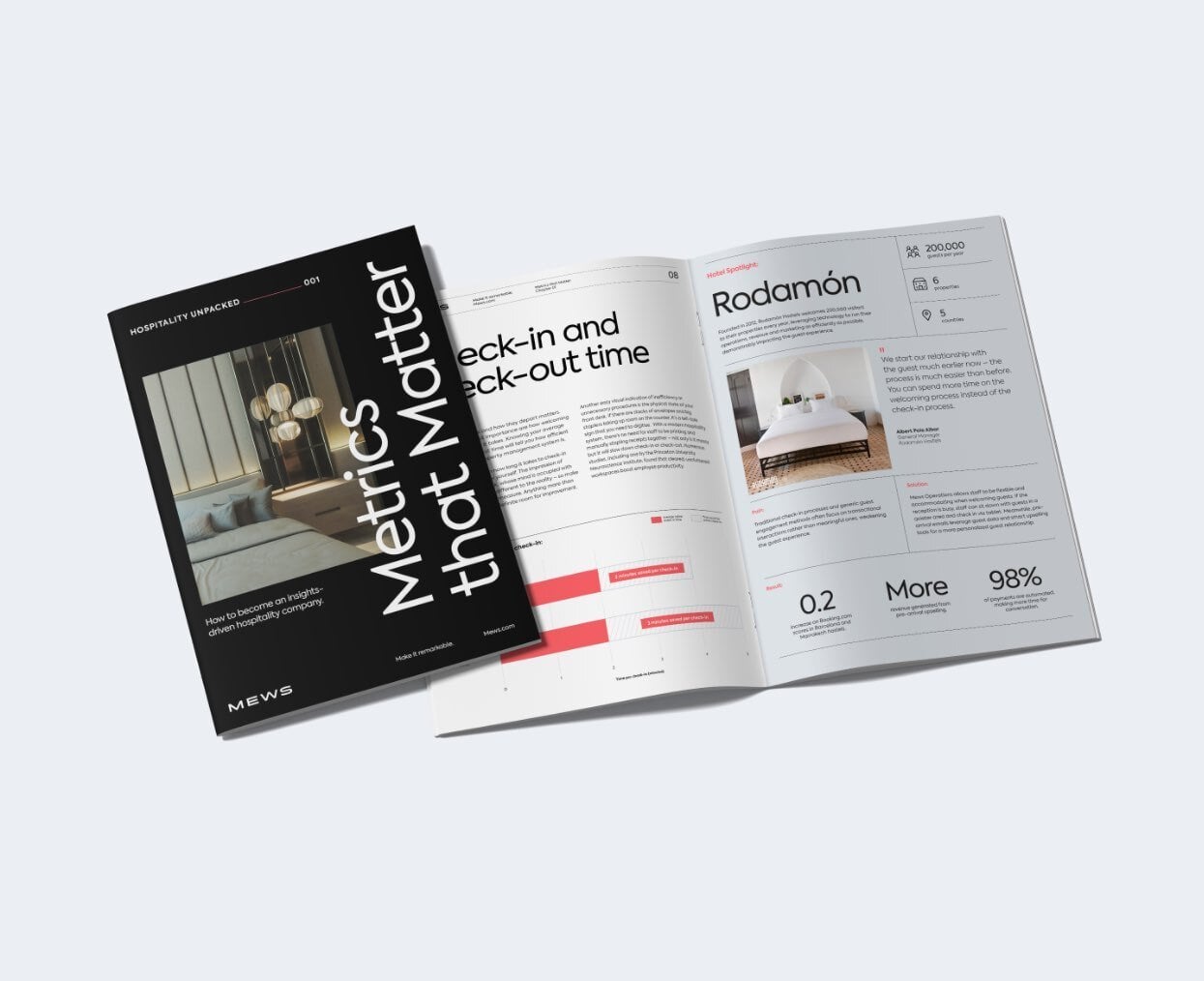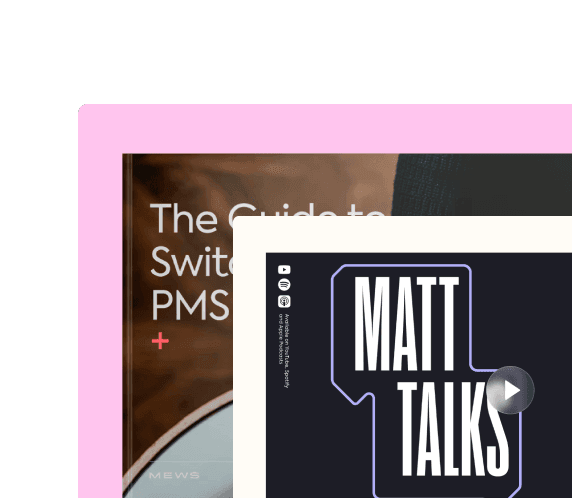Crafting your hotel budget is one of the most critical steps toward your property's success. Why? Because a poorly planned budget can hinder your ability to reach your goals, while an overly generous one might cut into your profits. Striking the right balance is essential if you want to ensure the longevity of your hotel.
Let's look at all the key factors and questions that can help you find the sweet spot for your hotel.
What is a hotel budget?
A hotel budget is essentially your financial roadmap, aligning with your hotel's strategic goals to guide how you'll spend and generate money throughout a specific period (typically a fiscal year). It's not just a tool for the finance department; it influences decision-making across all levels of your operation and determines how resources are allocated during the budgeted timeframe.
A well-rounded hotel budget takes into account various revenue streams, such as room bookings, ancillary services, and food and beverage sales, while also considering operational costs, marketing budgets, and overall expenditures.

Do all hotels need a budget?
The simple answer is yes. Without a well-structured budget, your hotel would struggle to stay organized or manage daily operations effectively. A budget keeps your team focused, improves organization, and streamlines processes, all while offering valuable insights into how well your hotel is being managed.
What are the main elements of a hotel budget?
- Revenue forecasts: predicting periods of high demand or low demand based on market factors, seasonal events and other variables that will affect demand. Using a revenue management system can help you make more accurate predictions.
- Operational costs: these are the fixed costs that include staff salaries, supplies, utilities and software.
- Marketing and sales expenses: depending on what you want to achieve, marketing and sales campaigns can be a significant part of your budget. This includes campaigns you run on different marketing channels and the investment needed to generate leads.
- Capital expenditures: funds used in the hospitality industry to acquire, upgrade or maintain long-term assets, such as hotel facilities, equipment or technology.
- Fixed and variable costs: you'll need to account for fixed costs like staff wages, utilities and supplies, as well as variable costs that depend on hotel occupancy rates and other factors.
- Contingency funds: funds set aside for emergencies, disasters or immediate repairs.
When is the hotel budgeting season?
The hotel budgeting season typically starts in October and runs through December as hotels plan for the upcoming fiscal year. However, the preparatory phase often begins as early as August, when hotels start analyzing data, making strategic decisions based on real-time results and aligning with all teams.
Factors influencing a hotel budget
Several factors can affect a hotel's budget, both internal and external. Let's take a look at what they are:
- Competition: your competitive set will dictate your pricing strategies and what you offer. It's important to conduct proper benchmarking when setting a budget to ensure you're allocating resources to the right distribution channels and areas of your hotel to stay competitive.
- Capital expenditures: hotels don't invest every year, but when it's time for property renovations, improvements or investments in new technology like a PMS or channel manager, this can significantly impact your budget.
- Occupancy rates: hotel occupancy rates can be greatly impacted by events, festivals or other happenings in the local area, which can affect your forecasted occupancy rate. Conversely, if a major event is being hosted by a competitor, this can negatively impact your room revenue.
- Market trends: a hotel's budget is influenced by hotel industry KPIs (key performance indicators), changes in traveler behavior and shifts in the sociopolitical landscape (social tension, war, inflation, recession).
- Fixed and variable costs: these costs help you evaluate how much to set aside for bills, insurance and utilities, while supplies and inventory will fluctuate based on occupancy. Operational efficiency relies on finding a balance between resource allocation and budgeting.
- Regulations: labor laws, taxes, and health and safety regulations may lead to increased costs, which will also affect your hotel budget.
Why is a hotel budget important?
A hotel budget is crucial because it empowers you to allocate resources more effectively, manage operating costs, set realistic revenue goals, and prepare for unexpected challenges like sudden facility breakdowns or economic downturns. By considering all these elements, your hotel can stay on track to achieve its objectives and stay afloat no matter the macro or micro economic factors.
Every hotel needs a solid financial plan to ensure that its financial outcomes align with its business goals, and that each department plays its part in hitting those targets.
Benefits of hotel budgeting across departments
- Guides staffing and operational planning
- Supports marketing and promotional decisions
- Aligns all departments with financial goals
- Enhances forecasting and performance tracking
- Helps allocate resources needed for digital marketing and campaigns, and defines promotional plans
- Drives consistent messaging and brand positioning
- Boosts transparency and accountability
- Strengthens strategic decision-making
- Helps identify growth areas and risks

Who should be involved in the hotel budgeting process?
It's important to involve department heads who best understand their needs and goals based on the previous year's performance, as well as the hotel director who has oversight of the hotel's strategic and operational goals, including larger 3-5 year projects that could affect the budget in the long term.
Different types of hotel budgets
There are several types of hotel budgets, each designed to address specific aspects of your financial planning. Together, they provide a comprehensive financial structure that ensures your hotel operates smoothly and efficiently.
Departmental budget
A departmental budget is crafted for each individual department, taking into account both fixed and variable expenses. This also includes marketing budgets, which allocate funds and resources to marketing and promotional activities aimed at increasing bookings and visibility.
Operational budget
An operational budget, as the name implies, focuses on the day-to-day expenses necessary for the hotel to function smoothly. This covers essential costs like food and beverage supplies, utilities, employee wages, and housekeeping supplies.
Consolidated budget
A consolidated budget refers to the overall spend of the entire business collectively. It combines the financial performance of each department, individual departmental budgets, and the overall budget for the entire property, giving you a clear picture of the business's total spending and financial health.
Cash budgets
Cash-flow budgets are used to better plan and manage cash flow coming in and going out. Inflows might include loans, investments, or sales revenue, while outflows cover expenses like employee wages, rent, taxes, and other operational costs.
Capital Budget
Capital budgets focus on long-term investments, such as upgrading to smart room technology. Instead of concentrating on short-term returns, capital budgets are designed to evaluate how these longer-term projects will add value and drive growth over time.
7 steps to create your hotel budget
Now that we have some of the technicalities of budgeting behind us, let's take a look at the 5 steps to creating your hotel budget.
Step 1: Pre-budget planning
Before determining your hotel budget, it's important for hoteliers to know when budgeting season begins, identify stakeholders like hotel managers and department heads, and set realistic timelines based on short-term and long-term goals. You should also understand what worked and what needs improvement for the new season.
Step 2: Gather data
The first step is to gather all relevant data. Start by understanding your operational costs, including staff salaries, maintenance, utilities, marketing expenses, office supplies, food and beverage costs, inventory, amenities, and any other expenses related to your hotel's daily operations. Additionally, you should analyze last year's key metrics, such as occupancy rates, average daily rates (ADR), RevPAR (Revenue per Available Room), and customer acquisition costs.
You also want to collect data from guest feedback. This can help you to identify areas for improvement that might require additional investment. For example, if customers frequently mention uncomfortable beds, it might be time to budget for new mattresses to enhance the guest experience.
Step 3: Set objectives and goals
Setting specific measurable goals for specific time periods is important in understanding how well your hotel is performing. These individual goals should support your hotel's broader objective.
Step 4: Forecast
Hotel forecasting is key to predicting future revenue based on historical data, market trends and upcoming promotional activities or local events. Forecasting can be done by month, quarter and by year to predict periods of low and high demand.
Step 5: Allocate resources
Resource allocation is also closely tied to forecasting. because in periods of high demand you will need to allocate more resources to staff wages, whereas in periods of low demand, less resources. Beyond operational costs, you'll also want to consider how much to allocate to marketing, property improvements, and technology.
Step 6: Monitor, adjust, implement
Budgets should be closely monitored and adjusted regularly to compare your results against projections and ensure you're meeting your strategic goals. Make sure the budget is shared across departments, and that everyone is engaged in being an active participant in reaching their performance metrics.
Step 7: Post-budget review and reporting
Conduct variance analysis to identify where your hotel business underperformed or didn't comply with the budget. It's also important to review departmental reporting and insights from hotel managers and department heads, and determine lessons learned for the next budget cycle so you can create initiatives aimed at performing better next year.
5 tips for effective hotel budgeting
Now let's look at some of the tips for effective hotel budgeting
Leverage technology for smarter budgeting
What is revenue management without the right software? This is why it's key to use a revenue management system to optimize room rates, forecast revenue, monitor KPIs and make strategic, data-informed decisions. The more you can unlock revenue potential through different pricing strategies - adjusting rates for different room types and revenue strategies - the easier it will be to create a realistic budget.
Focus on revenue-driving areas
To create an effective hotel budget, focus on the areas that drive the most revenue and allocate more resources to those activities. This means identifying your key profit drivers like room sales, food and beverages, events, or spa offerings. Allocating a larger budget to these areas will help grow these high-performing segments and maximize returns.
Take a granular approach to marketing
It's also a good idea to take a granular approach to marketing where each channel and individual expense is accounted for. This allows for smarter, data-driven decisions. Breaking your marketing into specific components like digital ads, social media campaigns and email marketing - each with its own budget, performance metrics, and ROI - allows you to allocate resources accordingly and improve forecasting.
Use data-driven forecasting
The ability to forecast revenue with precision by using key performance indicators like room revenue, occupancy rates, ADR (Average Daily Rate) and RevPAR (Revenue per Available Room) can help inform your hotel budget. These metrics provide a clear picture of expected room revenue, allowing hotels to plan more confidently and allocate resources accordingly.
Track food and beverage income based on average guest spend
Estimate food and beverage revenue based on average guest spend, keeping in mind that not all guests will dine at your hotel's bar or restaurant. Be sure to track changes in guest behavior to refine your projections for the following year. This helps create realistic revenue projections. Tracking shifts in guest behavior, like changing dining preferences or booking patterns, helps refine the budget forecast year over year.
Get a full picture of operational expenses
When budgeting for operational expenses, break them down into specific items so you can get a more accurate picture of your projected operational costs. Factor in capital for unexpected expenses such as repairs or emergencies, and plan major property renovations strategically, spreading out capital expenditures to avoid having to address everything at once.
Common hotel budgeting mistakes to avoid
Being too optimistic
Budgeting is not easy, and as we all want our hotels to exceed expectations. However, being overly optimistic can lead to unrealistic goals, which may frustrate your staff if they struggle to meet them. To avoid this, base your forecasts on realistic data that considers all market conditions and past performance.
Not accounting for the unexpected
They always say you should have a "cushion" when it comes to budgeting, and hotel budgets are no exception. Unpredictable events-whether they're market shifts, fluctuations in demand, emergencies, or issues within your hotel-can significantly impact your budget if you're not prepared. To avoid this pitfall, it's essential to build in an "emergency fund" as part of your budget. This financial buffer ensures you're covered when the unexpected happens, keeping your hotel on a stable footing.
Inflexibility
Inflexibility is another common issue because budgets should not be stagnant as market conditions and operational needs are constantly evolving. Adjusting budgets regularly (whether yearly or monthly depending on market volatility) is key. Being too rigid could lead to inaccurate or incomplete financial predictions that might negatively affect profitability.
Conclusion
In this guide, we've covered all the essentials of hotel budgeting to help your hotel better prepare for the future and ensure profitability. By understanding how to properly budget, your staff will be able to work better towards an overarching goal, and your management team will have better control of how well both staff and the overall operations are performing. Effective hotel budgeting is not just a strategy-it's a necessity for success.
Want to align your budget with the KPIs that drive success?
Download our guide "The Metrics that Matter"

Written by

Eva Lacalle
Eva a plus d’une décennie d’expérience internationale dans le marketing, le marketing numérique, la communication et l’événementiel. Lorsqu’elle ne travaille pas, elle aime surfer, danser ou explorer le monde.










